Itinerary
Top Attractions
- Sao Jorge Castle
- Jeronimos Monastery
- Belém Tower
- Lisbon Oceanarium
- Sintra Day Trip
- National Palace Ajuda
- Lisbon Zoo
- Queluz National Palace
- Lisbon Cathedral
- Pasteis de Belém
- National Pantheon
- Pilar 7 Bridge Experience
- Benfica Stadium Tour
- Arco da Rua Augusta
- Santa Justa Lift
- Pink Street
- LX Factory
- Carmo Convent
About
Disclaimer
Posts on visit-lisbon.net may contain affiliate links, meaning we get a small commission if you decide to make a purchase through our links, at no cost to you. Any income earned helps maintain this website and keeps it ad-free.
Where to Stay in Lisbon in 2025: Best Areas & Neighbourhoods
Not Sure Where to Stay in Lisbon? Here’s What You Need to Know

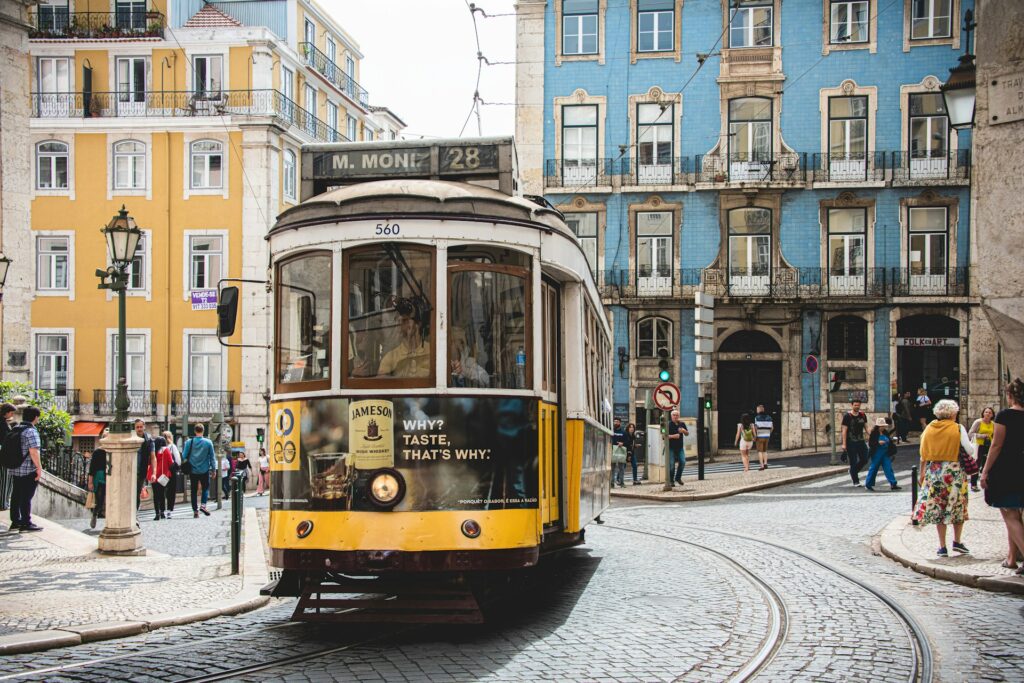
Lisbon is one of our favourite cities in Europe, but like any capital, deciding where to stay can be a bit overwhelming. The experience of your whole trip can totally change depending on which neighbourhood you decide to stay in, so it’s worth taking the time to do some proper research before jumping into booking the accommodation.
Each area has its own charm and vibe so it really depends on what kind of traveller you are and the trip you’re planning. Whether it’s your first visit, you’re here for the food, or just want a peaceful place to unwind after a day of exploring, this guide breaks down the best areas to stay in Lisbon Portugal in 2025.
We’ll detail the most popular neighbourhoods to stay in Lisbon – Baixa, Chiado, Alfama, Belém, Príncipe Real and Parque das Nações; with pros and cons of each, so you can find your perfect base in Portugal’s capital city.
Best Areas to Stay in Lisbon by Traveller Type
| Traveller Type | Recommended Area | More Info |
|---|---|---|
| First-Time Visitors | Baixa – central, walkable, close to main attractions | Read more |
| Families | Príncipe Real or Parque das Nações – peaceful, green, spacious and kids-friendly | Read more / Read more |
| Culture & History Lovers | Alfama – Lisbon’s oldest district with fado and historic charm | Read more |
| Foodies & Café Culture | Chiado – elegant, central, and full of cafés, shops, and theatres | Read more |
| Relaxed & Scenic Stays | Belém – riverside, open spaces, monuments and museums | Read more |
BAIXA
Baixa is without a doubt the best area to stay in Lisbon for first-time visitors or short city breaks as you’ll be within walking distance of many top attractions in Lisbon, such as the Santa Justa Lift.
Baixa is full of shops, restaurants and cafés, and it has a lively atmosphere throughout the day. The whole area was rebuilt by the Marquis of Pombal after the big earthquake in in the 18th century. Today, it’s home to some of Lisbon’s most well-known streets and squares, like Praça do Comércio and Rua Augusta.
One downside of staying in such a central area is that accommodation in Baixa can be expensive, especially during high season. That said, it may still be worth it, as you’ll likely save money by not needing to use the Lisbon public transportation much.
Since Baixa is one of the most popular parts of the city for travellers, it can get crowded during peak season. If you’re after a quieter spot, consider looking at nearby areas like Chiado or Príncipe Real.


Pros and Cons of Staying at Baixa in Lisbon
| Pros |
|
| Cons |
|
CHIADO
Chiado is one of the most elegant and charming neighbourhoods to stay in Lisbon. It’s located between Baixa and Bairro Alto, making it a great option if you want to stay close to the main attractions in Lisbon but in a calmer setting. The area is full of historic cafés like A Brasileira, theatres, and bookshops, including the world’s oldest Livraria Bertrand, giving it a slightly bohemian atmosphere.
Chiado is also home to several cultural and historic landmarks. The beautiful Praça Luís de Camões is a popular meeting point, surrounded by lively streets and traditional tiled buildings. Just a short walk away, you’ll find the striking Convento do Carmo, with its roofless Gothic ruins and archaeological museum, and the iconic Santa Justa Lift, offering panoramic views over Lisbon.
It’s a great area for food lovers and anyone interested in art, culture or shopping, with plenty of galleries, boutiques, and restaurants to explore. Chiado is a popular choice for travellers looking for a balance between convenience and charm, although it can be one of the more expensive parts of Lisbon.
The area is well connected by metro, with the Baixa-Chiado metro station, and several tram lines, so getting around the city is easy.

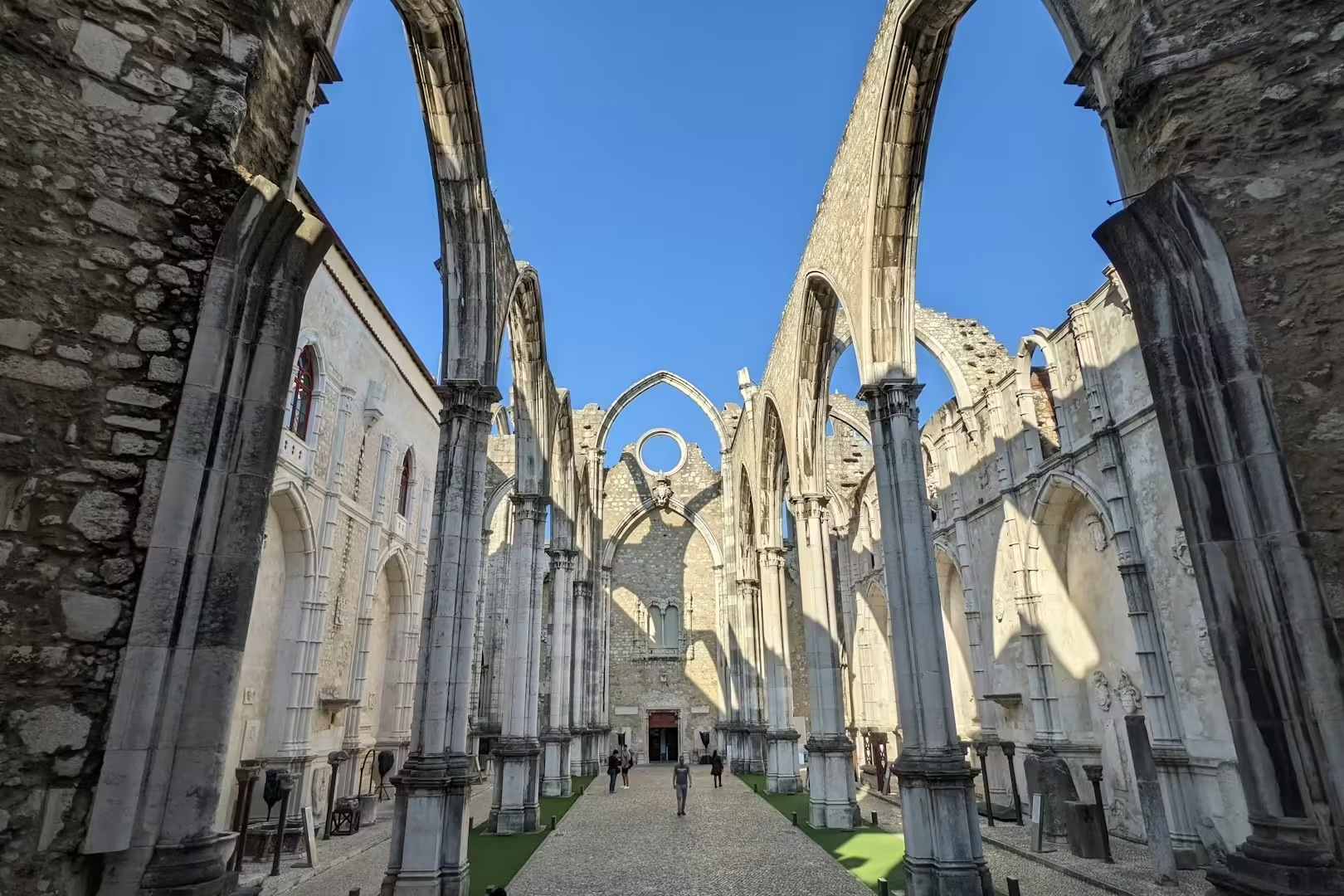
Pros and Cons of Staying at Chiado in Lisbon
| Pros |
|
| Cons |
|
ALFAMA
Alfama is Lisbon’s oldest neighbourhood, a maze of narrow streets, alleys, and stairways. It’s a popular choice for travellers looking for a more authentic Lisbon experience, with plenty of fado houses, local restaurants, small shops and stunning viewpoints (miradouros) like Santa Luzia and Portas do Sol.
There’s plenty of cultural history in the area, including São Jorge Castle, the Lisbon Cathedral, the National Pantheon and the Fado Museum.
That said, the main challenge of staying in Alfama is the uphill walking, which can be tiring, especially in the heat or when carrying luggage. There’s no metro station in the neighbourhood, so you can either walk or hop onto the tram 28. Taxis can’t always drop you at the door due to the maze-like layout.
The accommodation in Alfama consists of smaller guesthouses or apartments, full of character but without the conveniences of a hotel, such as lifts or soundproofing. Also, if you are looking for late-night bars and restaurants, this area may not be for you as it gets a bit quiet at night.


Pros and Cons of Staying at Alfama in Lisbon
| Pros |
|
| Cons |
|
BELÉM
Belém is a peaceful southwestern district of Lisbon, known as the launch point of Portugal’s great Age of Discoveries. You’ll find iconic landmarks like the Belém Tower, the Jerónimos Monastery, and the Monument to the Discoveries, all within walking distance of each other.
Belém is also a great starting point to cross the river and enjoy views of the iconic 25 de Abril Bridge and Cristo Rei, a towering statue that overlooks the city from across the Tagus.
If you’re in the area, you can’t miss the original Pastéis de Belém, the most famous bakery in Portugal that has been serving custard tarts since 1837.
The district is well connected to central Lisbon by public transport, which makes it a popular daytime destination. It can also be a good place to stay if you’re looking for somewhere quieter and more spacious, although there are fewer hotel options and limited nightlife.
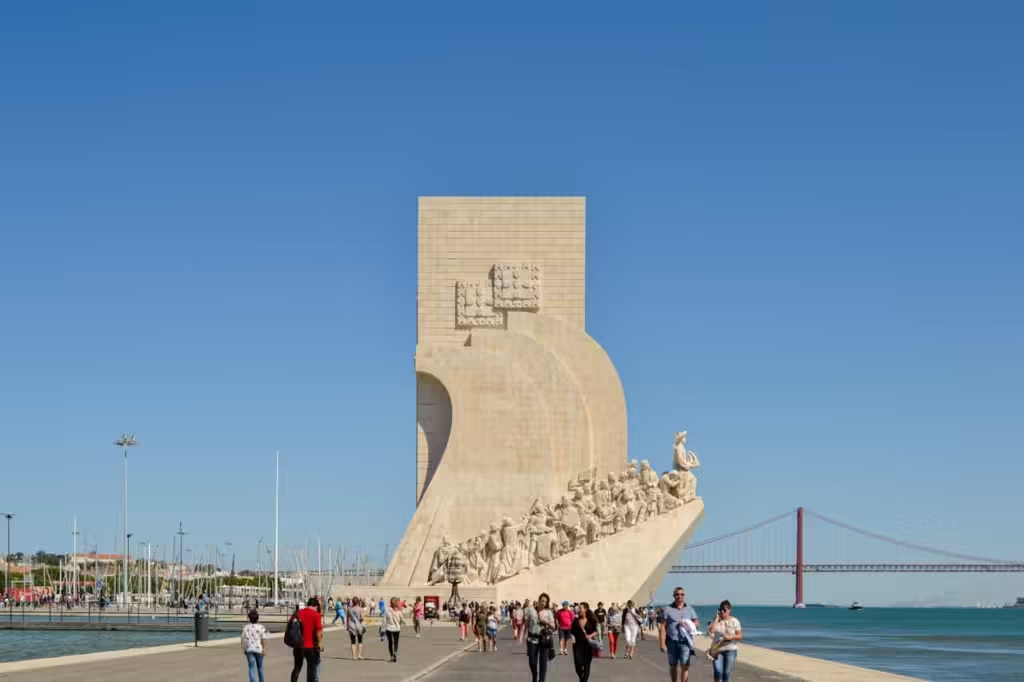
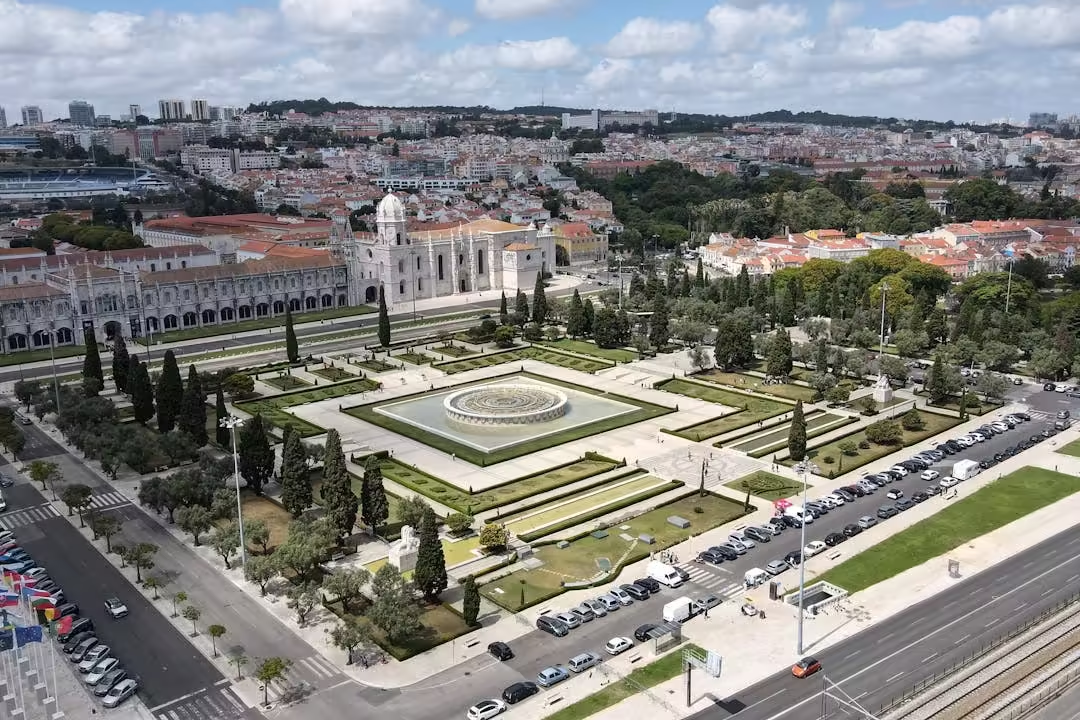
Pros and Cons of Staying at Belém in Lisbon
| Pros |
|
| Cons |
|
PRÍNCIPE REAL
Príncipe Real is one of Lisbon’s most trendy yet relaxed neighbourhoods, located just north of Bairro Alto and Chiado. It’s known for its elegant 19th-century buildings, calm streets and green spaces, such as the Jardim do Príncipe Real, making it a favourite for families and travellers seeking a quieter spot.
In this area you’ll also find plenty of concept and antique stores, trendy cafés, and some of Lisbon’s best restaurants. A standout is Embaixada, a beautiful 19th-century palace turned shopping gallery that showcases Portuguese brands. Just a short walk away, the Miradouro de São Pedro de Alcântara offers one of the city’s best panoramic views, and the Glória funicular makes the uphill climb much easier.
While Príncipe Real is peaceful and well-located, it’s not ideal if you’re looking for late-night activity and hilly terrain might be a factor for those with mobility concerns.

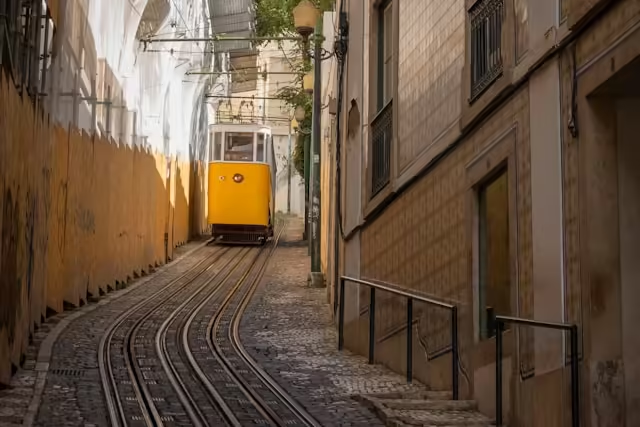
Pros and Cons of Staying at Príncipe Real in Lisbon
| Pros |
|
| Cons |
|
PARQUE DAS NAÇÕES
Parque das Nações is one of the most modern and spacious parts of the city, located in eastern Lisbon. It’s a great choice for travellers visiting with kids or anyone looking for flat and accessible walking routes. Originally developed for the Expo ’98, this district feels completely different from older neighbourhoods like Baixa or Alfama.
Although it’s slightly further from the historic centre (around 5–6 km from Baixa/Chiado), it’s very well connected to the rest of Lisbon, taking only about 7–10 minutes by train or metro.
There’s plenty to see and do in the area, including the popular Lisbon Oceanarium, science museums, cable car rides and the Vasco da Gama shopping centre. While you won’t find the traditional charm of Lisbon’s oldest areas here, you’ll benefit from a wider range of modern and family-friendly hotels, many of which even come with pools.
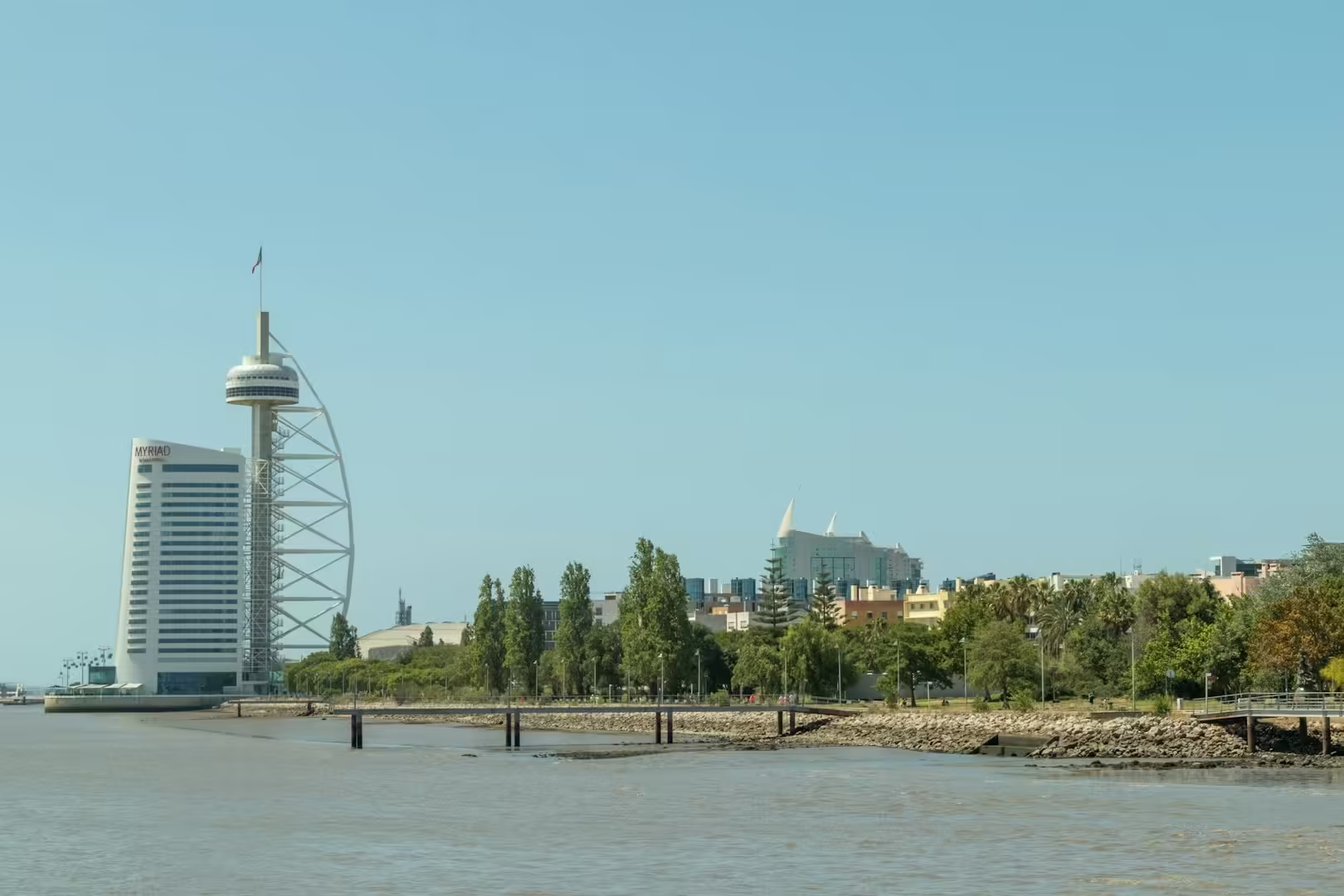
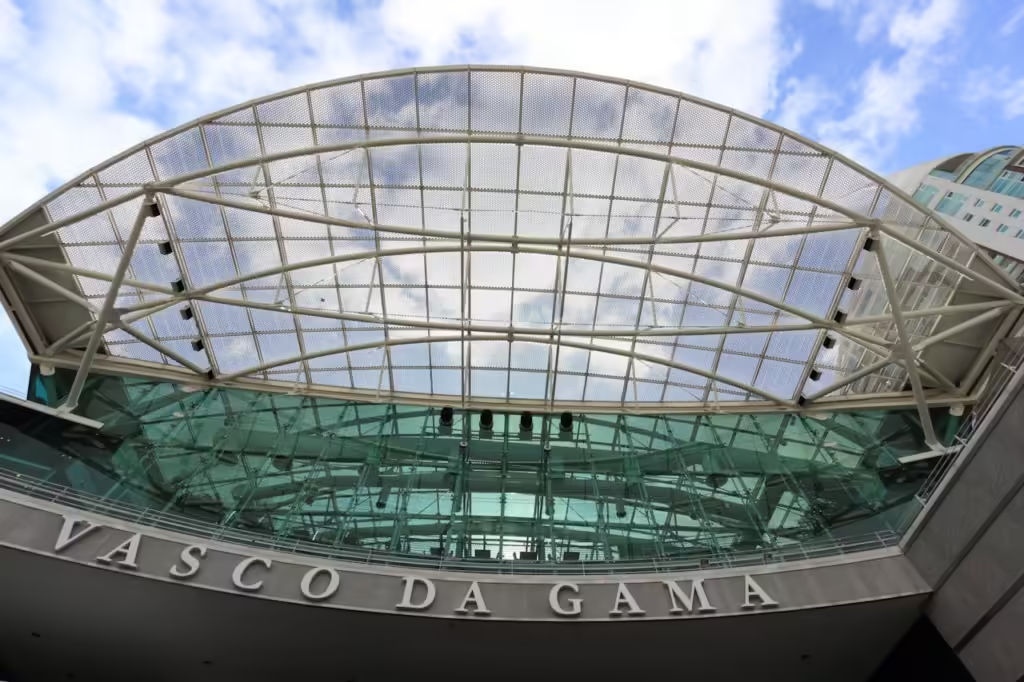
Pros and Cons of Staying at Parque das Nações in Lisbon
| Pros |
|
| Cons |
|
Lisbon Neighbourhoods: Frequently Asked Questions
What’s the best area to stay in Lisbon for first-time visitors?
We recommend Baixa for first-time travellers – it’s central, mostly flat, highly walkable, and very close to Lisbon’s main attractions.
Which Lisbon neighbourhood is best for families?
If you’re wondering where to stay in Lisbon with family, we recommend staying in Príncipe Real or Parque das Nações. Príncipe Real is ideal if you want to stay somewhere peaceful, elegant, and central. It’s known for its parks (like Jardim do Príncipe Real), wide sidewalks, and relaxed atmosphere. Parque das Nações is further from the city centre but is very flat, spacious, and packed with family-friendly attractions like the Oceanarium, riverside walks, and cable cars. It’s also very well connected by metro and train.
Is Lisbon safe?
Yes, Lisbon is generally a very safe city for travellers, but like in any touristy place, pickpocketing can happen – just keep an eye on your belongings around major attractions and busy areas.
What’s the quietest area to stay in Lisbon?
If you’re looking for a quiet spot to stay in Lisbon, Príncipe Real, Belém, and Parque das Nações are all great options. Príncipe Real is a calm residential neighbourhood still close to the city centre. Belém, located by the river with plenty of open spaces and gardens, is perfect for a relaxed stay. Parque das Nações is more modern and spacious, with flat streets and fewer tourists. All three are ideal if you want to escape the hustle and bustle of the city centre.
Tips for Booking Accommodation in Lisbon
Finding the right place to stay in Lisbon can make a big difference to your trip. Here are some tips to help you make the best choice:
- Book early, especially in spring and summer – Lisbon has become a very popular destination, and good places can book out quickly during peak months. If you want a good place at a decent price, make sure you book your accommodation with plenty of time.
- Heads up on the tourist tax – Like many other European cities, Lisbon charges a small tourist tax (usually €2 per person, per night) that’s often paid at check-in. It’s worth factoring this into your budget.
- Choose a neighbourhood that suits your trip – Lisbon has very distinct areas, each of them with its own vibe and atmosphere, so think about what you want to see and do.
- Watch out for hills – Lisbon is for its hilly streets. Some areas like Baixa are quite flat, but others, like Alfama, involve steep climbs. If mobility is a concern, check location details carefully.
- Read recent reviews – Some hotels, even the 4-star ones, can feel a little outdated. Reviews on sites like TripAdvisor or Airbnb are great for getting a feel for what the place is actually like, in terms of comfort, cleanliness, and noise levels.
- Check nearby transport links – Lisbon’s public transport is very reliable, but not all neighbourhoods have equal access. Staying near a metro station or tram stop can make exploring the city a lot easier.
More on Visit-Lisbon




